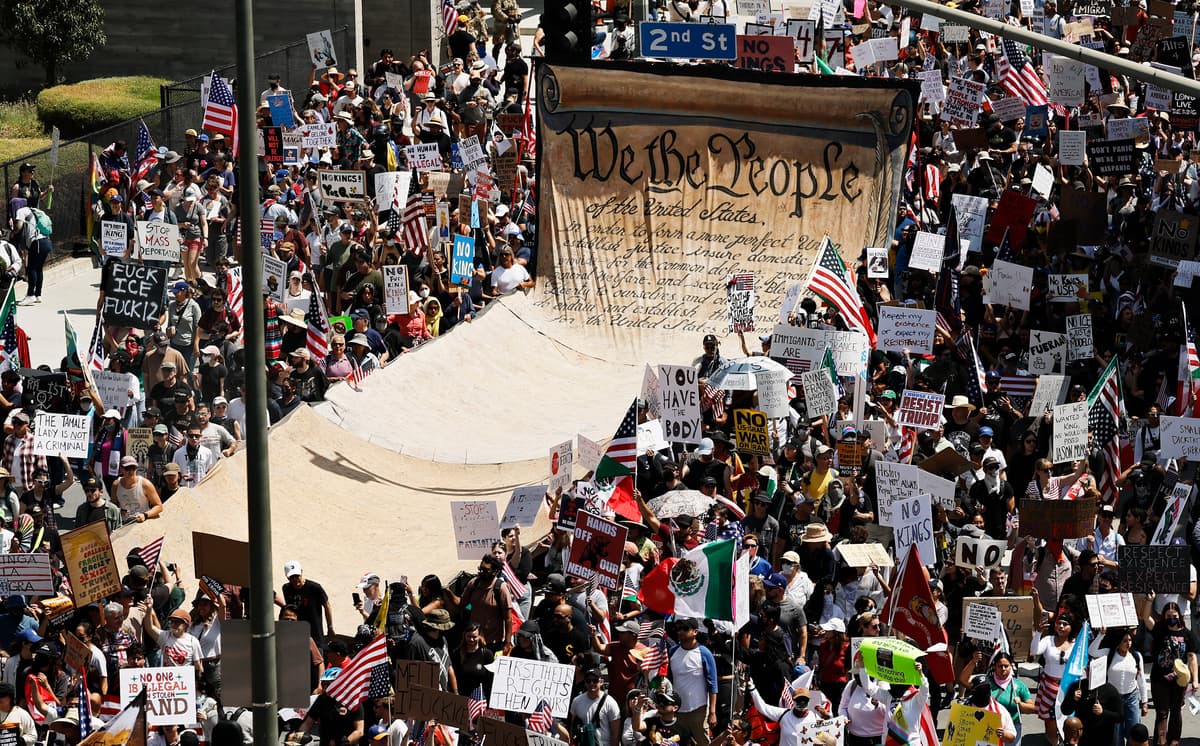‘No Kings’ Protests, Returning on Saturday, Promise a Venting of Rage Rather Than a Strategy to Win
Once the shouting is over and the signs discarded, the Democrats will be no closer to producing an agenda that can win elections.

On Saturday, opponents of President Trump will rally across the nation in their latest No Kings protests. It’s a chance to express anger, but once the shouting is over and the signs discarded, the Democratic Party will be — tick tock, tick tock — no closer to producing an agenda that can win elections or persuade Americans that Mr. Trump is a monarch.
On Wednesday’s “Real Coffee With Scott Adams,” the host, author, and creator of the comic strip “Dilbert” called No Kings “an imaginary solution to an imaginary problem.” The event, he said, “only exists to make money for the organizers,” because “nobody’s stealing their democracy.”
Mr. Adams said, “There is no logical, common-sense way that people wandering around this weekend on a nice autumn day is going to change anything in the real world.” While seeking redress for grievances is an American tradition, Saturday’s marches lack a proper goal such as ending a war or repealing Prohibition.
Absent a clear message, No Kings isn’t the rhetorical dagger that its supporters need. It starts with “no,” which is negative and repels people. Plus, the year is 2025 not 1775. Americans are fascinated, not revolted, by monarchies. Note that the Adams, Kennedy, Roosevelt, and Bush families are all referred to as dynasties and political royalty.
The Duke of Sussex, Prince Harry, and his American wife, Meghan Markle, have parlayed blue blood into wealth and fame. The prince’s mother — Diana, Princess of Wales — captured American hearts. Ever since President Wilson appointed an “industry tsar,” Bernard Baruch, in 1918, his successors have granted the Russian ruler’s mantle to aides.
Today, regal titles are bestowed as honorifics, not insults. The queen of soul, Aretha Franklin. The king of rock and roll, Elvis Presley. The king of pop, Michael Jackson. An NBA star, LeBron James, is called King James. The “Purple Rain” singer, named Prince Nelson, went only by Prince. His father, John, had been Prince John on stage.
Multiple supermarket chains use “king,” as does Burger King. All these positive associations make it difficult to stoke the revulsion that the Founding Fathers felt for monarchs. The cumulative result is that those who don’t view Mr. Trump as an imperial president will see No Kings as a slogan with no political cause behind it.
Even when King George III’s tyranny was in living memory, the Whigs didn’t beat President Jackson by dubbing him “King Andrew.” Old Hickory was the top vote-getter in 1824, 1828, and 1832. After two terms, he was succeeded by his vice president, Martin Van Buren, who promised a de facto third term.
A Whig, William Harrison, won the presidency in 1836. When he died after a month in office, President Tyler — a Jacksonian Democrat — acceded. In 1844, President Jas. Polk rode Jackson’s support to victory. Old Hickory’s shadow endured even after his death in 1845. In 1852, President Franklin Pierce won with the nickname Young Hickory.
By the Gilded Age, American attitudes to royalty had warmed to the point that Americans with “new money” sought out marriages to titled foreigners. President Theodore Roosevelt, nursing the old resentments, disliked the future British prime minister, Winston Churchill, in part because his mother was a wealthy New York heiress and his father a British lord.
Following World War I’s dissolution of empires, monarchs became revered figureheads rather than absolute rulers. No Kings protests planned for British Commonwealth countries like Canada, Australia, and the United Kingdom — reminded that the head of state of these nations is King Charles III — renamed their events “No Tyrants.”
The No Kings protesters believe that Americans can be made to see Mr. Trump as they do. Yet reactive, Whig-style opposition only stirs up those already in opposition. The better play would be to use the tools the Constitution provides to check executive power, even if winning elections is a lot harder than shouting at an imaginary crown.

